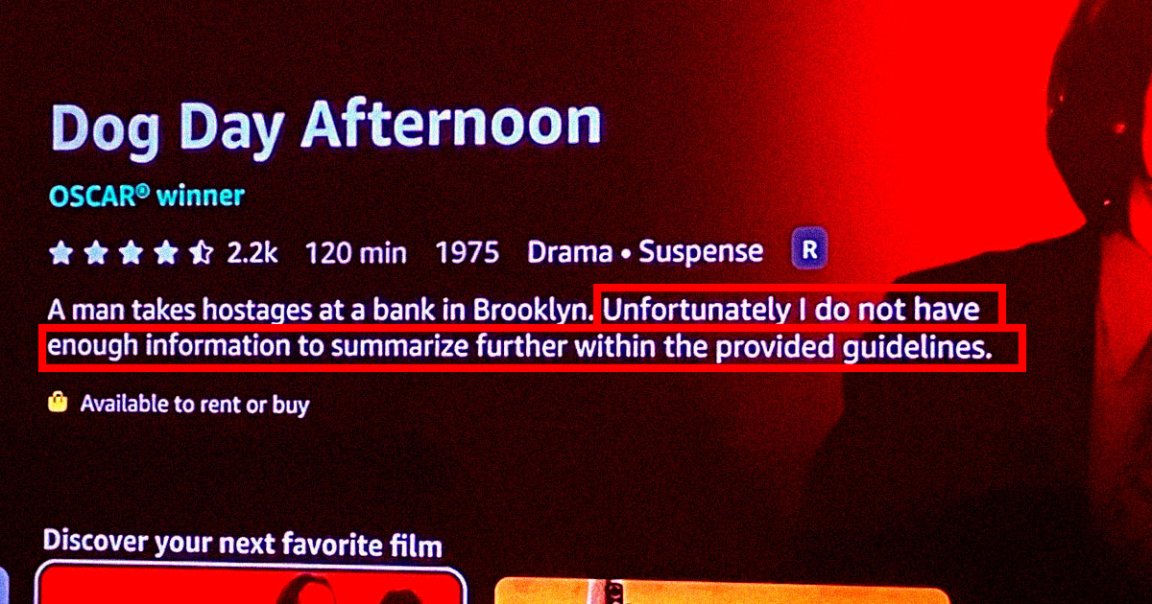
Amazon’s Prime Video on-demand streaming service appears to be using generative AI to write up public movie summaries — and the results are embarrassing, with what looks like AI slop getting copy-pasted into the description of an iconic film.
A viral image on Bluesky shows the description of the Oscar-winning 1975 drama “Dog Day Afternoon,” starring Al Pacino, which includes the suspicious phrase: “Unfortunately I do not have enough information to summarize further within the provided guidelines.”
As people quickly pointed out, that sounds exactly like it was written by an AI chatbot like ChatGPT, which often generate phrases just like this one to indicate when they’re not able to generate a suitable output — one of the most straightforward signs an AI was used when they’re unintentionally left behind in text.
The faux pas, which has been caught by at least two other eagle-eyed Prime Video subscribers within the last month, has seemingly been corrected since then.
“A loser (Al Pacino) and his buddy (John Cazale) rob a Brooklyn bank,” the movie’s description now reads.
Futurism reached out to Amazon for clarification on how it comes up with movie descriptions, or whether AI is involved, but the company has yet to respond.
The incident highlights the many growing pains in adopting the technology — and just how easily avoidable many of these mistakes are.
“It’s so easy to not use AI for these things,” said TikTok user donnerrb, who first flagged the offending text, in a January 24 video. “A human could have done this in three seconds.”
“I will do it,” he added. “Amazon, call me. I’ll write your summaries. I literally will, because this level of laziness is insane.”
As another user quickly pointed out, Amazon has owned IMDb since 1998 — meaning it “could have just scraped their summary” from there.
A more insidious interpretation of the blunder is the fact that “Dog Day Afternoon” includes a character who desires to have sex-reassignment surgery. Given the recent assault on the rights of transgender people, Amazon may have trained its AI to avoid the subject entirely, leading to the generic phrase appearing in the movie’s description.
“Given the topic of the film, I hate to feel it necessary to assume that the ‘guidelines’ preventing a better description may be ‘do not mention trans people,'” one Bluesky user suggested.
It’s not the first time we’ve encountered Amazon’s streaming service hastily employing generative AI with unintentionally hilarious results.
Last month, Amazon was mocked mercilessly online for adorning the iconic 1922 horror film “Nosferatu” with a slapdash poster that was generated by an AI. The image, first discovered by eagle-eyed netizens last fall, features a yassified rendition of the vampire Count Orlok that looks like it was yanked straight out of a “Twilight” movie.
Despite the sloppy execution and embarrassing missteps, the e-commerce giant has publicly committed itself to the widespread use of generative AI.
In November, Amazon announced that it would be using AI to “improve your streaming experience,” from boosting dialogue to generating “X-Ray Recaps,” or “easy-to-digest summaries” of TV content.
In other words, we wouldn’t be surprised to see Amazon continuing to bungle its rollout of AI tools in the near future. Worse yet, considering the tech’s propensity to “hallucinate” facts, users should be aware of the possibility that they’re being lied to about what just happened in their favorite show.
More on Amazon: Asked for Products to Kill Yourself With, Amazon’s AI Says “You Are Not Alone” and Hallucinates an Incorrect Phone Number for a Suicide Hotline